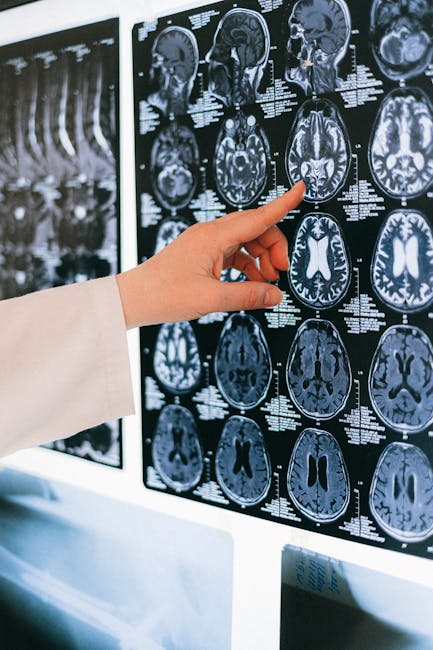GSS Disease: Understanding, Diagnosing, and Managing Gerstmann-Sträussler-Scheinker Syndrome
Gerstmann-Sträussler-Scheinker syndrome (GSS) is a rare, inherited, and fatal neurodegenerative disorder. It’s classified as a prion disease, meaning it’s caused by abnormally folded proteins that accumulate in the brain, leading to progressive neurological damage. Unlike some other prion diseases like Creutzfeldt-Jakob disease (CJD), GSS is almost exclusively inherited, meaning it’s passed down through families.
Understanding the Genetics of GSS
GSS is caused by mutations in the PRNP gene, which codes for the prion protein (PrP). These mutations lead to the production of misfolded PrP proteins, which are resistant to degradation. These misfolded proteins clump together, forming aggregates that disrupt the normal function of brain cells. Different mutations in the PRNP gene can result in variations in the clinical presentation and progression of GSS.
The inheritance pattern of GSS is typically autosomal dominant, meaning only one copy of the mutated PRNP gene is sufficient to cause the disease. This means that if one parent carries the mutated gene, there’s a 50% chance their child will inherit it and develop GSS. Genetic testing can confirm the presence of these mutations and help in diagnosis and family planning.
Symptoms of GSS Disease
The symptoms of GSS typically begin in middle age, although the onset can vary significantly depending on the specific mutation. The disease progresses slowly, often over several years. Early symptoms can be subtle and easily overlooked, making early diagnosis challenging. Common symptoms include:

- Cerebellar ataxia: Difficulty with coordination and balance, leading to problems with walking, speaking, and fine motor skills.
- Cognitive impairment: Memory loss, difficulty with problem-solving, and impaired judgment.
- Dementia: Progressive decline in cognitive function, leading to significant impairment in daily life.
- Dysarthria: Difficulty with speech articulation.
- Dysphagia: Difficulty swallowing.
- Parkinsonism: Symptoms resembling Parkinson’s disease, such as rigidity, tremor, and slow movement.
- Myoclonus: Involuntary muscle jerks.
- Visual disturbances: Blurred vision or double vision.
As the disease progresses, symptoms worsen, and individuals may become completely dependent on others for care. The severity and progression of symptoms can vary significantly between individuals, even within the same family.
Diagnosing GSS
Diagnosing GSS can be challenging due to the overlap of its symptoms with other neurological conditions. There is no single definitive test for GSS. Diagnosis typically involves a combination of:

- Detailed medical history: A thorough review of the patient’s symptoms and family history is crucial.
- Neurological examination: Assessing the patient’s neurological function to identify specific impairments.
- Brain imaging: MRI or CT scans of the brain may reveal characteristic changes associated with GSS, although these findings are not always conclusive.
- Genetic testing: This is the most definitive diagnostic test, identifying mutations in the PRNP gene.
- CSF analysis: Cerebrospinal fluid (CSF) analysis may show elevated protein levels, although this is not specific to GSS.
- Brain biopsy: In some cases, a brain biopsy may be considered to confirm the diagnosis, but this is invasive and rarely performed.
Managing GSS Disease
Unfortunately, there is no cure for GSS, and treatment options are limited. Management focuses on alleviating symptoms and improving the patient’s quality of life. This may involve:
- Supportive care: This includes managing symptoms such as pain, difficulty swallowing, and respiratory problems.
- Physical therapy: To improve mobility and coordination.
- Occupational therapy: To help maintain daily living skills.
- Speech therapy: To improve communication skills.
- Psychological support: For both the patient and their family to cope with the challenges of the disease.
Research and Future Directions
Research into GSS is ongoing, focusing on understanding the underlying mechanisms of the disease and developing potential therapeutic strategies. While there is no current cure, researchers are exploring various approaches, including gene therapy and the development of drugs that target misfolded prion proteins.
Genetic Counseling and Family Planning
Genetic counseling is crucial for families affected by GSS. It helps individuals understand their risk of inheriting the disease, and to make informed decisions about family planning. Prenatal testing and preimplantation genetic diagnosis are available options for couples at risk of having a child with GSS.
Living with GSS
Living with GSS presents significant challenges for both the patient and their family. Support groups and organizations providing resources and information can play a vital role in improving the quality of life for individuals with GSS and their caregivers. Early diagnosis and comprehensive supportive care are critical to managing the symptoms and ensuring the best possible outcome.
This information is intended for educational purposes only and should not be considered medical advice. Always consult with a healthcare professional for any health concerns or before making any decisions related to your health or treatment.


